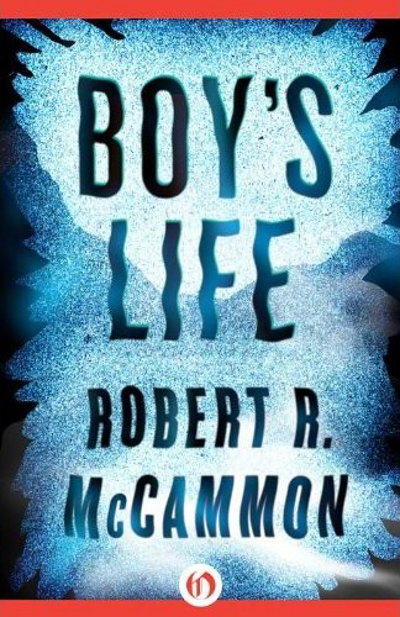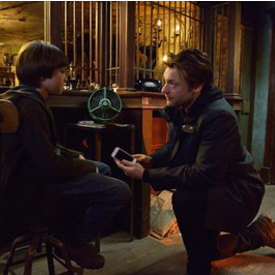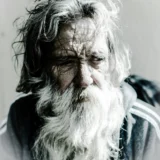Open Road Media is now turning its spotlight on Robert R. McCammon one of the most acclaimed horror authors of our time and author of the award winning novel Boy’s Life.
One of the founders of the Horror Writers Association, Robert R. McCammon is one of the country’s most accomplished authors of modern horror and historical fiction. In 1991, Boy’s Life won the World Fantasy Award for best novel.
Small town boys see weird sights, and Zephyr has provided Cory Jay Mackenson with his fair share of oddities. He knows the bootleggers who lurk in the dark places outside of town. On moonless nights, he’s heard spirits congregate in the churchyard to reminisce about the good old days. He’s seen rain that flooded Main Street and left it crawling with snakes. Cory knows magic, and relishes it as only a young boy can. One frosty winter morning, he and his father watch a car jump the curb and sail into the fathomless town lake. His father dives into the icy water to rescue the driver, and finds a naked corpse handcuffed to the wheel. This chilling sight is only the start of the strangest period of Cory’s life, when the magic of his town will transform him into a man.

Excerpt from Chapter One
My dad went over a checklist with the foreman, a big crew-cut man named Mr. Bowers, and then Dad and I started loading our truck. Here came the bottles of milk, the cartons of fresh eggs, buckets of cottage cheese and Green Meadows’ special potato and bean salads. Everything was still cold from the ice room, and the milk bottles sparkled with frost under the loading dock’s lights. Their paper caps bore the face of a smiling milkman and the words “Good for You!” As we were working, Mr. Bowers came up and watched with his clipboard at his side and his pen behind his ear. “You think you’d like to be a milkman, Cory?” he asked me, and I said I might. “The world’ll always need milkmen,” Mr. Bowers went on. “Isn’t that right, Tom?”
“Right as rain,” my dad said; this was an all-purpose phrase he used when he was only half listening.
“You come apply when you turn eighteen,” Mr. Bowers told me. “We’ll fix you up.” He gave me a clap on the shoulder that almost rattled my teeth and did rattle the bottles in the tray I was carrying.
Then Dad climbed behind the big-spoked wheel, I got into the seat next to him, he turned the key, and the engine started and we backed away from the loading dock with our creamy cargo. Ahead of us, the moon was sinking down and the last of the stars hung on the lip of night. “What about that?” Dad asked. “Being a milkman, I mean. That appeal to you?”
“It’d be fun,” I said.
“Not really. Oh, it’s okay, but no job’s fun every day. I guess we’ve never talked about what you want to do, have we?”
“No sir.”
“Well, I don’t think you ought to be a milkman just because that’s what I do. See, I didn’t start out to be a milkman. Granddaddy Jaybird wanted me to be a farmer like him. Grandmomma Sarah wanted me to be a doctor. Can you imagine that?” He glanced at me and grinned. “Me, a doctor! Doctor Tom! No sir, that wasn’t for me.”
“What’d you start out to be?” I asked.
My dad was quiet for a while. He seemed to be thinking this question over, in a deep place. It occurred to me that maybe no one had ever asked him this before. He gripped the spoked wheel with his grown-up hands and negotiated the road that unwound before us in the headlights, and then he said, “First man on Venus. Or a rodeo rider. Or a man who can look at an empty space and see in his mind the house he wants to build there right down to the last nail and shingle. Or a detective.” My dad made a little laughing noise in his throat. “But the dairy needed another milkman, so here I am.”
“I wouldn’t mind bein’ a race car driver,” I said. My dad sometimes took me to the stock car races at the track near Barnesboro, and we sat there eating hot dogs and watching sparks fly in the collision of banged-up metal. “Bein’ a detective would be okay, too. I’d get to solve mysteries and stuff, like the Hardy Boys.”
“Yeah, that’d be good,” my dad agreed. “You never know how things are gonna turn out, though, and that’s the truth. You aim for one place, sure as an arrow, but before you hit the mark, the wind gets you. I don’t believe I ever met one person who became what they wanted to be when they were your age.”
“I’d like to be everybody in the world,” I said. “I’d like to live a million times.”
“Well” — and here my father gave one of his sagely nods — “that would be a fine piece of magic, wouldn’t it?” He pointed. “Here’s our first stop.”
That first house must’ve had children in it, because they got two quarts of chocolate milk to go along with their two quarts of plain milk. Then we were off again, driving through the streets where the only sounds were the wind and the barking of early dogs, and we stopped on Shantuck Street to deliver buttermilk and cottage cheese to somebody who must’ve liked things sour. We left bottles glistening on the steps of most of the houses on Bevard Lane, and my dad worked fast as I checked off the list and got the next items ready from the chilly back of the truck; we were a good team.
Dad said he had some customers down south near Saxon’s Lake and then he’d swing back up so we could finish the rest of the street deliveries before my school bell rang. He drove us past the park and out of Zephyr, and the forest closed in on either side of the road.
It was getting on toward six o’clock. To the east, over the hills of pine and kudzu, the sky was beginning to lighten. The wind shoved its way through the trees like the fist of a bully. We passed a car going north, and its driver blinked the lights and Dad waved. “Marty Barklee deliverin’ the newspapers,” Dad told me. I thought about the fact that there was a whole world going about its business before the sun, and people who were just waking up weren’t part of it. We turned off Route Ten and drove up a dirt drive to deliver milk, buttermilk, and potato salad to a small house nestled in the woods, and then we went south toward the lake again. “College,” my dad said. “You ought to go to college, it seems to me.”
“I guess so,” I answered, but that sounded like an awful long distance from where I was now. All I knew about college was Auburn and Alabama football, and the fact that some people praised Bear Bryant and others worshipped Shug Jordan. It seemed to me that you chose which college to go to according to which coach you liked best.
“Gotta have good grades to get into college,” Dad said. “Gotta study your lessons.”
“Do detectives have to go to college?”
“I reckon they do if they want to be professional about it. If I’d gone to college, I might’ve turned out to be that man who builds a house in empty space. You never know what’s ahead for you, and that’s the — ”
Truth, he was about to say, but he never finished it because we came around a wooded bend and a brown car jumped out of the forest right in front of us and Dad yelped like he was hornet-stung as his foot punched the brake.
The brown car went past us as Dad whipped the wheel to the left, and I saw that car go off Route Ten and down the embankment on my right. Its lights weren’t on but there was somebody sitting behind the wheel. The car’s tires tore through the underbrush and then it went over a little cliff of red rock and down into the dark. Water splashed up, and I realized the car had just plunged into Saxon’s Lake.
“He went in the water!” I shouted, and Dad stopped the milk truck, pulled up the hand brake, and jumped out into the roadside weeds. As I climbed out, Dad was already running toward the lake. The wind whipped and whirled around us, and Dad stood there on the red rock cliff. By the faint pinkish light we could see the car wallowing in the water, huge bubbles bursting around its trunk. “Hey!” Dad shouted with his hands cupped around his mouth. “Get out of there!” Everybody knew Saxon’s Lake was as deep as sin, and when that car went down into the inky depths it was gone for good and ever. “Hey, get out!” Dad shouted again, but whoever was behind the wheel didn’t answer. “I think he’s been knocked cold!” Dad told me as he took off his shoes. The car was starting to turn onto its passenger side, and there was an awful howling sound coming from it that must’ve been the rush of water pouring into the car. Dad said, “Stand back.” I did, and he leaped into the lake.
He was a strong swimmer. He reached the car in a few powerful strokes, and he saw that the driver’s window was open. He could feel the suction of water moving around his legs, drawing the car down into the unfathomed deep. “Get out!” he hollered, but the driver just sat there. Dad clung to the door, reached in, and grabbed the driver’s shoulder. It was a man, and he wore no shirt. The flesh was white and cold, and my dad felt his own skin crawl. The man’s head lolled back, his mouth open. He had short-cropped blond hair, his eyes sealed shut with black bruises, his face swollen and malformed from the pressures of a savage beating. Around his throat was knotted a copper piano wire, the thin metal pulled so tightly that the flesh had split open.
“Oh Jesus,” my dad whispered, treading water.
The car lurched and hissed. The head lolled forward over the chest again, as if in an attitude of prayer. Water was rising up over the driver’s bare knees. My dad realized the driver was naked, not a stitch on him. Something glinted on the steering wheel, and he saw handcuffs that secured the man’s right wrist to the inner spoke.
My dad had lived thirty-four years. He’d seen dead men before. Hodge Klemson, one of his best friends, had drowned in the Tecumseh River when they were both fifteen years old, and the body had been found after three days bloated and covered with yellow bottom mud like a crusty ancient mummy. He’d seen what remained of Walter and Jeanine Traynor after the head-on collision six years ago between Walter’s Buick and a logging truck driven by a kid eating pep pills. He’d seen the dark shiny mass of Little Stevie Cauley after firemen doused the flames of the crumpled black dragster named Midnight Mona. He had looked upon the grinning rictus of death several times, had taken that sight like a man, but this one was different.
This one wore the face of murder.
The car was going down. As its hood sank, its tail fins started rising. The body behind the wheel shifted again, and my father saw something on the man’s shoulder. A blue patch, there against the white. Not a bruise, no; a tattoo. It was a skull with wings swept back from the bony temples.
A great burst of bubbles blew out of the car as more water rushed in. The lake would not be denied; it was going to claim its toy and tuck it away in a secret drawer. As the car began to slide down into the murk, the suction grabbed my father’s legs and pulled him under, and standing on the red rock cliff I saw his head disappear and I shouted “Dad!” as panic seized my guts.
Underwater, he fought the lake’s muscles. The car fell away beneath him, and as his legs thrashed for a hold in the liquid tomb, more bubbles rushed up and broke him loose and he climbed up their silver staircase toward the attic of air.
I saw his head break the surface. “Dad!” I shouted again. “Come on back, Dad!”
“I’m all right!” he answered, but his voice was shaky. “I’m comin’ in!” He began dog-paddling toward shore, his body suddenly as weak as a squeezed-out rag. The lake continued to erupt where the car disturbed its innards, like something bad being digested. Dad couldn’t get up the red rock cliff, so he swam to a place where he could clamber up on kudzu vines and stones. “I’m all right!” he said again as he came out of the lake and his legs sank to the knees in mud. A turtle the size of a dinner plate skittered past him and submerged with a perplexed snort. I glanced back toward the milk truck; I don’t know why, but I did.
And I saw a figure standing in the woods across the road.
Just standing there, wearing a long dark coat. Its folds moved with the wind. Maybe I’d felt the eyes of whoever was watching me as I’d watched my father swim to the sinking car. I shivered a little, bone cold, and then I blinked a couple of times and where the figure had been was just windswept woods again.
“Cory?” my dad called. “Gimme a hand up, son!”
I went down to the muddy shore and gave him as much help as a cold, scared child could. Then his feet found solid earth and he pushed the wet hair back from his forehead. “Gotta get to a phone,” he said urgently. “There was a man in that car. Went straight down to the bottom!”
“I saw … I saw …” I pointed toward the woods on the other side of Route Ten. “Somebody was — ”
“Come on, let’s go!” My father was already crossing the road with his sturdy, soggy legs, his shoes in his hand. I jump-started my own legs and followed him as close as a shadow, and my gaze returned to where I’d seen that figure but nobody was there, nobody, nobody at all.
Dad started the milk truck’s engine and switched on the heater. His teeth were chattering, and in the gray twilight his face looked as pale as candle wax. “Damnedest thing,” he said, and this shocked me because he never cursed in front of me. “Handcuffed to the wheel, he was. Handcuffed. My God, that fella’s face was all beat up!”
“Who was it?”
“I don’t know.” He turned the heater up, and then he started driving south toward the nearest house. “Somebody did a job on him, that’s for sure! Lord, I’m cold!”
Read My Profile









